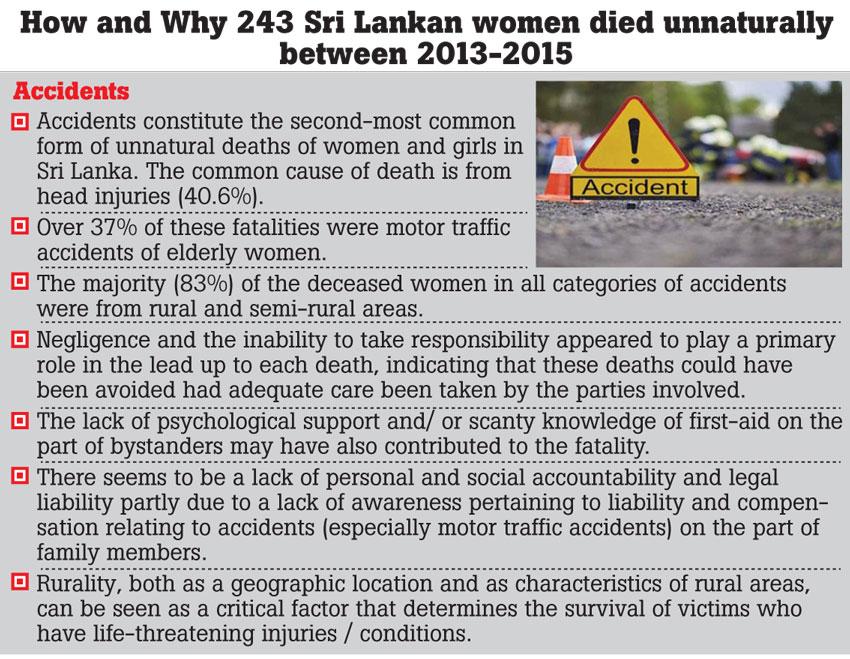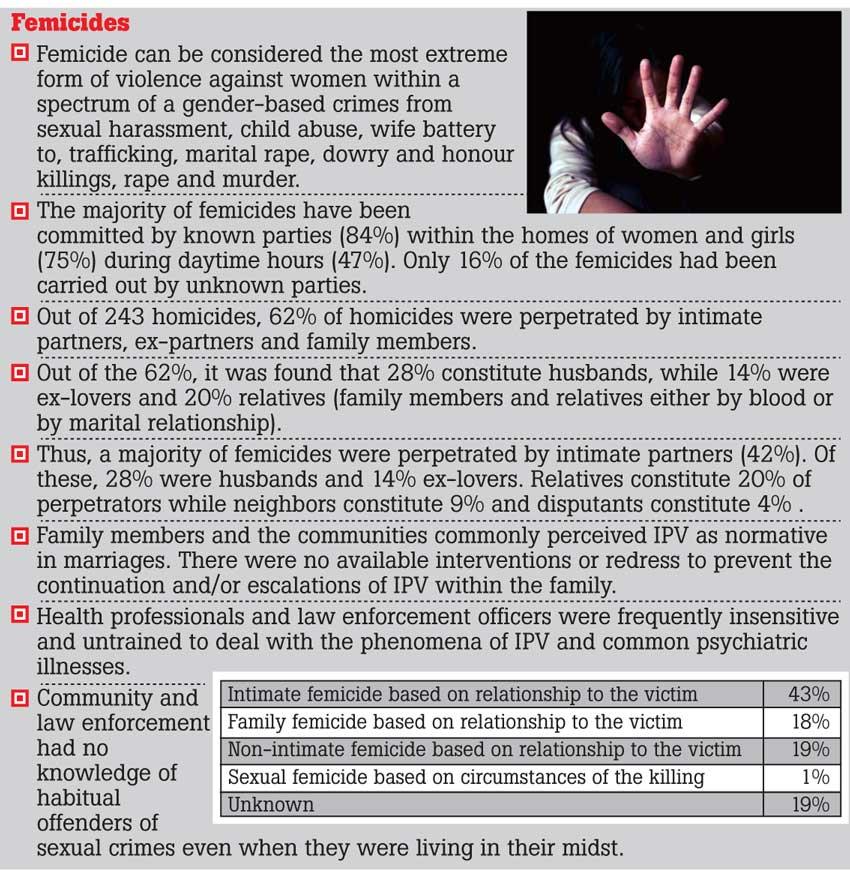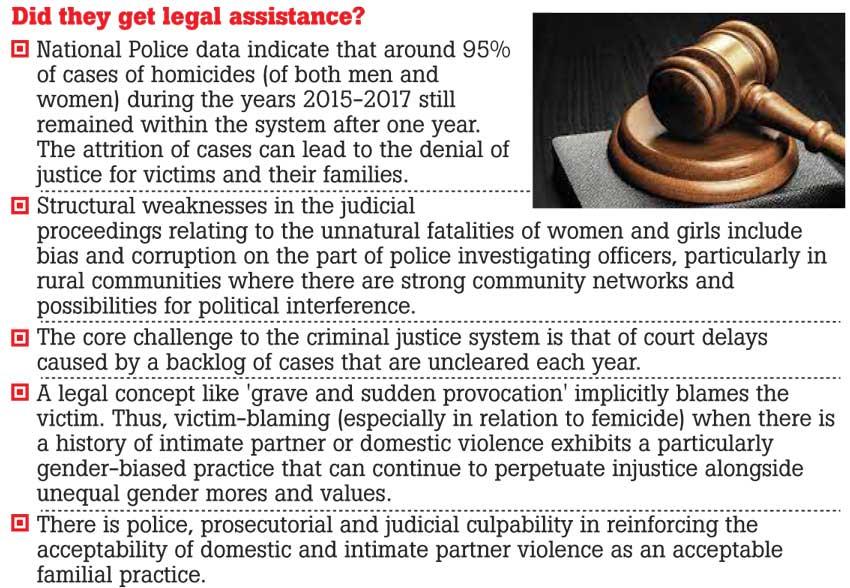Reply To:
Name - Reply Comment
Last Updated : 2024-05-04 00:05:00

As we continue to mark 16 days of activism, for which the global theme this year is femicide, we need to question why we shy away from these crimes
Violence against women often usually goes unreported. Silenced by stigma, silenced by fear of the perpetrators and fear of a justice system that might not do justice to women
We as women are 52 per cent of the population with only 5.3 per cent represented in parliament
Romantic and sexual relationships becoming unhealthy, specially due to lack of knowledge on human sexuality was evident
 “Women are 52 % of the population with only 5.3% represented in parliament.”
“Women are 52 % of the population with only 5.3% represented in parliament.”
Sharika Cooray - Officer-in-Charge
UNFPA Sri Lanka
Just last year, August 2020, a 14-year-old girl in Kandy was raped and in the same year a 72-year-old woman was raped in Mahiyangana. Reflecting, these crimes have no boundaries in age, location, ethnicity or socio-economic status. And the cases go on. These are only a handful of cases that have been reported.
We as women are 52 per cent of the population with only 5.3 per cent represented in parliament. The UNFPA supported the national women’s wellbeing survey which also indicated that one in four women and/or girls experience physical and/or sexual violence since the age of 15 by a partner or a non-partner. This issue is one of the most commonly violated human rights in the world but no one has given it the due recognition it deserves.
As we continue to mark 16 days of activism, for which the global theme this year is femicide, we need to question why we shy away from these crimes. The issue of violence against women and girls reaches every corner of the world. It knows no social, economic or national boundaries. Within the Covid-19 context, it still remains a shadow pandemic. Sadly despite the work done by government, women’s organisations and other parties, survivors of violence lack information, resources, mechanisms for redress, essential services that support their safety, access to justice and healthy lifestyle. This is why the launch of this report is
very crucial.
“Women and girls in Sri Lanka are much better off than many other developing countries”
Senior Professor Nilanthi de Silva - Vice Chancellor University of Kelaniya
The need to create a culture of high quality research of the highest international standards has been a driving force of the Faculty of Medicine which celebrated its 30th anniversary this year. We strive to engage in research activities that produce results that are of genuine value to our society and to our community either at national or international level, in whatever field of study we specialise in.
As a female scientist who has worked for many years on diseases that affect the poorest of the poor in tropical countries like ours, I can frequently observe the multiple disadvantages and challenges faced by most females in developing countries. However I’m also acutely aware that women and girls in Sri Lanka are much better off than many other developing countries particularly in South Asia.
Sri Lankan women and girls fare just as well as men and boys. And yet, women are grossly under-represented in our Sri Lankan parliament and other levels of political representation. This imbalance is seen even among our university students unions. The clear majority of undergraduate students in our university for example are female. And yet the student unions have virtually no female representations.

“Fear of a justice system that might not do justice to women”
Hanaa Singer Hamdy -
Resident Coordinator, UN Sri Lanka
Violence against women often usually goes unreported. Silenced by stigma, silenced by fear of the perpetrators and fear of a justice system that might not do justice to women.
This study is the first of its kind which takes into account forensic evidence of the different forms of traumatic deaths faced by women and girls in our beloved Sri Lanka. I want to recognise the University of Kelaniya and the UNFPA for bringing these findings to light. I think it is very courageous of them.
Protecting victims of intimate partner violence can include requiring police stations to maintain histories of domestic and intimate partner violence and having training of Police officers and Magistrates, under the Prevention of Domestic Violence Act. There are also some areas of the policies, laws and acts that need revision to assure quality and timely implementation.
“80% of homicides were classified intimate partner violence”
Professor Anuruddhi Edirisinghe, Professor of Forensic Medicine, University of Kelaniya
This book originated from the discipline of forensic medicine and it discusses how these deaths affect individuals and families, social, cultural gender and other ideologies. It also considers how these deaths could have
been prevented.
Why women and girls? If you look at the crime abstract of the Sri Lanka Police it only talks about the total number of homicides. There is no gender specific data. But when we looked into it, we found the male to female ratio as four to one. Over the past few years, somewhere around 500 deaths of homicides were recorded. In global statistics, there were similarities seen. But the issue is that 80% of these homicides were classified intimate partner violence, i.e. preventable deaths.
Earlier academics have highlighted this lack of data, so the team took up the challenge. We never had incidence rates for homicides, suicides and accidents. If I take it as a ratio, it is one homicide per 6 six suicides
and 5 accidents.
Romantic and sexual relationships becoming unhealthy, specially due to lack of knowledge on human sexuality was evident. Other contributors were lack of capacity and expertise to identify early indicators of mental illness and stressors within the family. There was also a dearth of qualified mental health doctors and counsellors, specially in rural areas.
We studied 243 homicides, and we were able to reach almost the national figures for those three years, which was 248. Majority of femicides were committed by a known person. 84 per cent was within their own homes, 75 per cent of these women died in their own home and half of them during day time. Only 16 per cent of homicides were carried out by unknown parties.
“Time to revisit misuse of defenses”
Professor Camena Guneratne - Senior Professor in Department of Legal Studies, Open University of Sri Lanka
Despite the huge volume of literature on the subject of gender and women in Sri Lanka this is the first time a book has focused specifically on this issue. Both the context of the homicides and the way in which the criminal justice system fails to handle them in a meaningful and holistic manner, caught my attention.
Between 2013 and 2017 the book has documented that only 4 out of 70 cases were brought to conclusion. The phrase justice delayed is justice denied applies here not only to the families of the victims but also to the accused. This chapter documents very carefully the stress and the trauma suffered by the families of victims due to delays.
Another issue highlighted in this book is the use, or rather the misuse of defences to murder, which enables the accused to either get a mitigated sentence or to be completely exonerated with a not guilty verdict.
These defences include mental illness, unsound mind, sometimes intoxication and grave and sudden provocation. All these defenses come to us from 19th century Victorian English Law. I think the time is right in all cases of criminal law to revisit these defenses and the way they have been consistently interpreted by courts and judges.
“A much needed research publication”
Dr. Sepali Kottegoda
- Women and Media Collective
Reading through this book I felt this was very much a research publication that we have been waiting for, for a long time. When the Women and Media Collective initiated advocacy towards the Prevention of Domestic Violence Act, we looked at newspaper reports.
That was what we had, we didn’t have this kind of study. And we realised that a lot of the violence against women that was being reported was within their homes. But even today, most such acts of violence are very likely not reported at all.





Widower Tuesday, 21 December 2021 04:45 PM
First consider and look into how women died during the 2009 year war. Shame and disgrace on you all to ignore it.

Add comment
Comments will be edited (grammar, spelling and slang) and authorized at the discretion of Daily Mirror online. The website also has the right not to publish selected comments.
Reply To:
Name - Reply Comment
US authorities are currently reviewing the manifest of every cargo aboard MV
On March 26, a couple arriving from Thailand was arrested with 88 live animal
According to villagers from Naula-Moragolla out of 105 families 80 can afford
Is the situation in Sri Lanka so grim that locals harbour hope that they coul
26 minute ago

7 hours ago